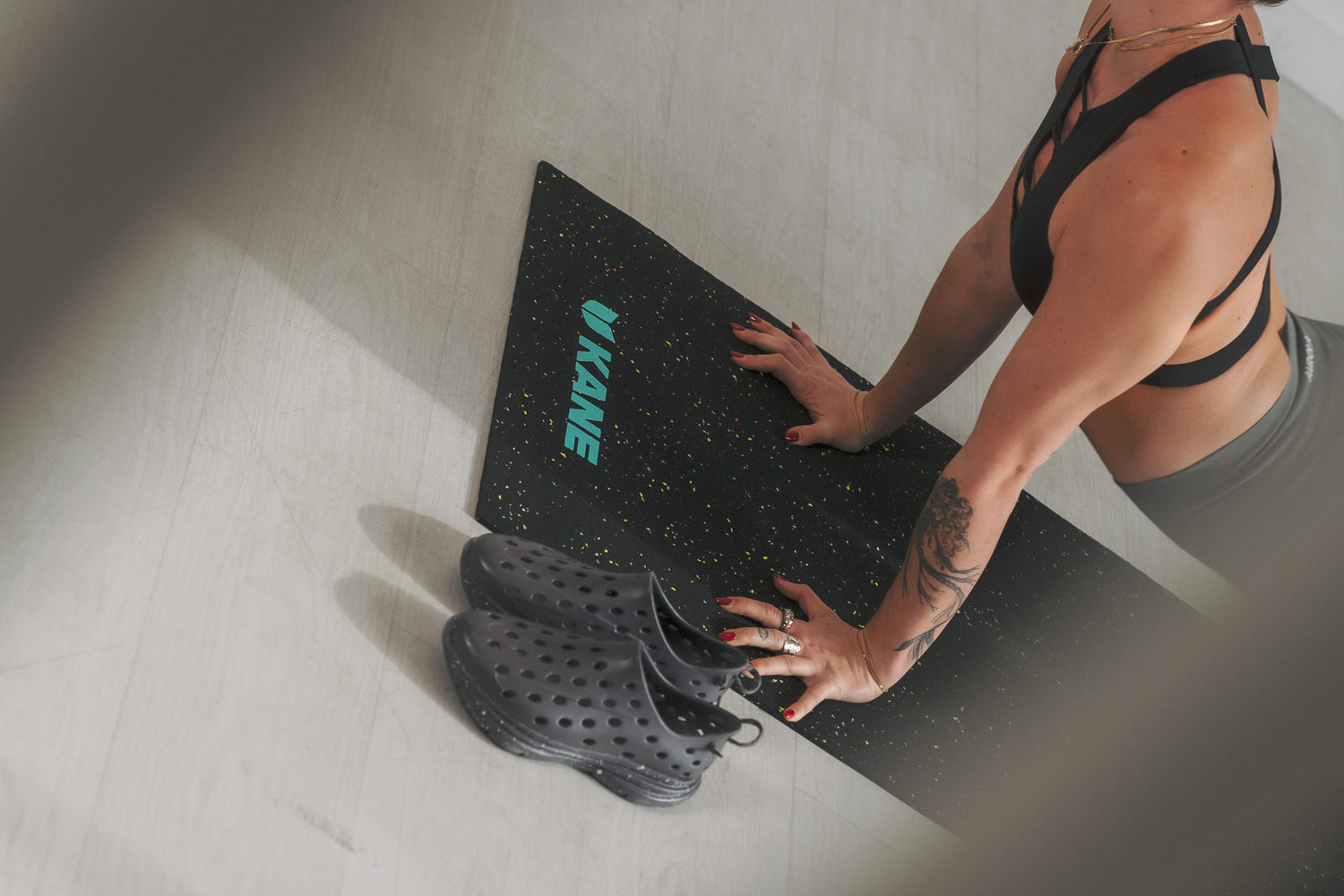We've all been there. There are days when the prospect of squeezing in a workout seems more daunting than ever. Whether juggling a hectic schedule or simply feeling drained, you're inevitably faced with the question: What do you do when you're too tired to work out?
These practical strategies and alternatives will help keep your fitness journey on track, even when you're feeling especially low on energy.
From prioritizing rest to incorporating light activities and making mindful adjustments to your routine, discover how to get more energy and navigate fatigue while living your life and maintaining a healthy and sustainable approach to exercise.
Finding the energy to exercise regularly
Finding the energy to work out can be daunting, particularly when faced with fatigue or a lack of motivation. However, several strategies can help you overcome these barriers and find the inspiration to engage in physical activity.
Firstly, establishing realistic goals and breaking them down into achievable steps can make workouts more manageable. Create a consistent routine by scheduling specific times for workouts. Bit by bit, this habit-building approach can make it easier to find the energy for physical activity.
Choosing activities that genuinely bring you joy can significantly impact your motivation. Whether it's dancing, hiking, cycling, or team sports, engaging in activities you enjoy transforms a workout from a chore into an enjoyable experience.
Variety is key to preventing monotony. Incorporate different exercises or try new activities to keep your workouts exciting and maintain your enthusiasm. If you are low on energy, consider starting with a shorter or less intense workout to ease into the routine.
Social support can play a crucial role. Working out with friends or joining group classes provides accountability and turns exercise into a social experience, increasing motivation.
Fueling your body with a balanced meal or snack before exercising gives you enough energy to exert yourself. Staying hydrated throughout the day and prioritizing sleep also put you in the best possible position.
Maintaining a positive mindset is essential. Focus on the positive outcomes of working out, such as improved mood, increased energy levels, and better overall health. Use motivational tools like energizing music or engaging podcasts to make your workouts more enjoyable.
If finding continuous workout time is challenging, consider smaller sessions throughout the day. Even brief bouts of activity can contribute to your overall fitness goals.
Ultimately, finding the energy to exercise is a gradual process that requires experimentation and patience. Be kind to yourself on days when motivation is low, and celebrate the small victories along the way. Consistency and a positive and flexible mindset are crucial to building a sustainable and enjoyable exercise routine.
Physical activity can give you an energy boost
Here are eight ways exercise can help provide you with energy:
1. Improved circulation and oxygen flow
Exercise gets the heart pumping, promoting the dilation of blood vessels and enhancing blood flow to various parts of the body. This increased circulation ensures that tissues receive an optimal oxygen supply and nutrients vital for cellular function and energy production.
2. Endorphin release
Endorphins are neurotransmitters that act as natural painkillers and mood elevators. Exercise, especially aerobic activities like running or cycling, triggers the release of endorphins, contributing to a positive mood and reducing feelings of fatigue.
3. Enhanced sleep quality
Regular physical activity and sleep quality have a bidirectional relationship. Research shows that a good workout can improve sleep. Sleep is when your body recovers; studies also suggest that the better you sleep, the higher your physical activity levels.
So, the higher the quality of your sleep, the more you're able to exercise. And the more you exercise, the better you'll be able to sleep.
4. Stress reduction
Exercise serves as a powerful stress management tool. Physical activity helps lower cortisol levels, the primary stress hormone, and stimulates the production of neurotransmitters like serotonin. This dual effect contributes to a calmer state of mind and decreased feelings of fatigue associated with stress.
5. Improved metabolism
Exercise enhances the efficiency of the body's metabolic processes. It increases the rate at which the body burns calories and converts nutrients into energy. As a result, individuals who engage in regular physical activity often experience more energy and improved endurance.
6. Enhanced muscle strength and endurance
Through resistance training and cardiovascular exercise, muscles adapt and become more resilient. This increased strength and endurance allow individuals to perform daily activities with less effort, reducing the perception of physical fatigue.
7. Regulation of hormones
Exercise influences the secretion and sensitivity of various hormones. For example, it improves insulin sensitivity, helping regulate blood sugar levels and preventing energy crashes. Hormonal balance achieved through regular exercise contributes to sustained energy throughout the day.
8. Better cardiovascular health
Aerobic exercise, such as jogging or swimming, gets blood pumping, strengthens the heart, and improves cardiovascular function. A healthier cardiovascular system means the heart can pump blood more efficiently, delivering oxygen and nutrients to tissues and organs with less strain.
Ways to boost energy levels that don't involve exercising
So, if you exercise regularly, it can help give you energy, but what if you're too tired to hit the gym or track in the first place? It can be challenging to stay motivated when you don't have the energy to exercise.
Here are some other ways to boost energy so that, hopefully, you'll feel energized enough to get that next workout in, whether it's a session with a personal trainer or at-home routine:
Prioritize quality sleep
Prioritize sleeping seven to nine hours each night to combat fatigue and enhance energy levels. Establish a consistent sleep schedule by going to bed and waking up at the same time every day. Create a relaxing bedtime routine, minimize screen time before bed, and ensure your sleep environment is comfortable and restful.
Stay hydrated
Dehydration can lead to feelings of fatigue, so ensure you're drinking enough water throughout the day. Aim to drink at least 8 cups (64 ounces) of water daily, and adjust your intake based on climate and physical activity.
Eat a balanced diet
Adequate nutrition is vital. Include a variety of nutrient-dense foods in your diet. Consume whole grains, lean proteins, fruits, vegetables, and healthy fats. Avoid eating excessive amounts of processed foods and refined sugars, as they can cause energy fluctuations. Foods high in fiber, protein, and complex carbohydrates can help prevent energy crashes.
Have regular, balanced meals
Eat smaller, balanced meals throughout the day to maintain steady blood sugar levels. To sustain energy, include complex carbohydrates like whole grains, proteins from lean sources, and healthy fats.
Manage stress
Practice deep breathing, meditation, or mindfulness techniques to reduce stress and increase energy. Engage in activities that bring you joy and relaxation, and consider seeking support from friends, family, or a mental health professional.
Take short breaks
Incorporate short breaks into your day to stand up, stretch, or take a quick walk. Taking breaks helps improve circulation, reduce muscle tension, and combat feelings of lethargy associated with prolonged sitting.
Expose yourself to natural light
Spend time outdoors during daylight hours. Exposure to natural light helps regulate your circadian rhythm, which can improve overall energy levels.
Limit caffeine intake
While caffeine can provide a temporary energy boost, excessive consumption can lead to dependency and disrupt sleep. Consume caffeine in moderation, and be mindful of how it affects your energy levels and sleep patterns.
Socialize and connect
Socializing and connecting with others can help improve your mood and energy levels. Make time for social activities, whether in person or virtually, to foster a sense of connection and well-being.
Listen to energizing music
Create playlists with music that uplifts and energizes you if you feel tired. Listening to upbeat and motivational tunes can help boost your mood and motivation.
Get fresh air
When you step outside, you are exposed to more oxygen, which can help increase your energy and alertness. So, take breaks to step outside and get fresh air. A change of scenery and spending time in nature can provide a mental refresh, helping combat fatigue and improve overall well-being.
Incorporating these habits can ensure we have the energy needed for exercising and enjoying our day-to-day lives. Be consistent and patient, as these changes may take time to show significant effects. If persistent fatigue is a concern, consulting with a healthcare professional is best to help out any underlying health issues.
When you should skip the workout
Knowing when to skip a workout is vital to maintaining a balanced and sustainable approach to fitness. One clear-cut situation where you should sit it out is when you're not feeling well. Symptoms such as fever, severe fatigue, or other signs of illness indicate that your body needs recovery rather than the additional stress of a workout.
Not getting a good night's sleep and nagging fatigue are also valid reasons to reconsider a workout. Pushing yourself through a session when you're exhausted not only poses an increased risk of injury but may also undermine the effectiveness of your efforts. Allowing your body the time it needs to recuperate in such instances can ultimately contribute to better overall performance.
Modifying your workout or taking a break is prudent if you're dealing with an injury or experiencing pain. Ignoring discomfort or pushing through pain can exacerbate the issue and potentially cause more significant problems down the line. Seeking guidance from a healthcare professional in such cases can help you make informed decisions about your fitness routine.
Moreover, high stress levels can have physical and mental repercussions. We tend to think of exercise as a stress reliever, but it's OK to prioritize relaxation techniques or alternative activities that promote well-being during particularly stressful periods. Feeling irritable, tired, and experiencing changes in sleep patterns may also indicate overtraining, signalling that you should take a break to allow for recovery.
Scheduled off days are crucial in preventing burnout and supporting long-term fitness gains. These designated breaks allow your body to recover, reducing the risk of injury.
Recognizing when to skip a workout is about listening to your body and understanding its signals for rest. While consistency in exercise is essential, finding a balance that respects your body's need for recovery is equally crucial. If you still have concerns or are unsure about making appropriate adjustments to your routine, seek advice from a healthcare professional or fitness expert.
Frequently asked questions
Is it OK to be too tired to work out?
It is OK to skip a workout if you're feeling tired. Exercising when exhausted can decrease performance, increase the risk of injury, and result in a poor recovery. According to experts, you don't need to stop exercising altogether if you're not sleeping well. Instead of intense workouts, opt for light, low-impact exercises such as walking or yoga.
What should I do when I'm too tired for the gym?
When you're too tired for the gym, opt for light, low-impact exercises that can still boost energy. If you're feeling extremely exhausted, engaging in intense workouts may be unsafe, as it can be challenging to focus, resulting in an increased risk of injury.
Consider activities like a morning walk or yoga or integrating more physical activity throughout the day, such as taking the stairs or parking farther away. Listen to your body and prioritize the recovery that your body needs.
Ultimately, exercise should help you feel energized. Don't worry if you don't feel up to a workout here and there. A break might be just what you need.
Should I exercise if I feel fatigued?
Opt for a rest day or consider light activities like walking (outside or on a treadmill) and yoga if you're mildly or moderately fatigued. You'll feel the benefits of gentle movement, which may even motivate you.
If experiencing severe fatigue, don't push yourself. Take a break and give your body time for proper recovery. Ensure you're hydrated and are getting enough nutrients, and listen to your body, adjusting your exercise routine accordingly.
Why am I always too tired to exercise?
Feeling constantly too tired to exercise could be a sign of an underlying issue, such as anxiety, depression, an inadequate diet, poor sleep, or underlying medical conditions like heart disease, diabetes, anemia, or thyroid disorders. Consulting with a healthcare professional is a good idea if you're constantly tired.





















































